Lecture
A few months ago, the guys with revealed the relationship between the PR page and its position in search results. That's what they found, then read below ![]()
PR Google all the same (though not much) affects the ranking of pages in the issue (as well as many other search engines). There are other, more important for the search engine parameters of the page: credibility and how well the search engine indexes links on the page.
These studies have intrigued me and on the basis of my data, I decided to conduct my own experiments - says Sean Ferguson. Since all the data is based on the root of the site, I decided to take the PR of the main page of each domain as a basis.
Randomly taken sites with an audience from the United States and sites with an audience from other countries were also compared. There were a number of differences between such sites.
PR has a total of 11 values (from 0 to 10). The difference between PR = 8 and PR = 9 is not at all the same as with PR = 3 and PR = 4. Each PR value has its own parameters.
The average PR value of the studied sites was PR = 6, while the lowest PR = 0, and the largest PR = 9. 10 sites had PR <3 and 7 had PR = 9.
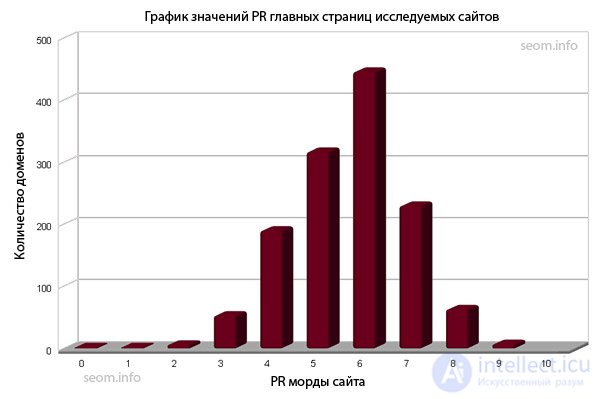
options
Using the Spearman coefficient, I compared several domains on the metric. The MozRank domain was very much like PR (r = 0.62). This relationship was slightly less than 0.71, which I received in May 2009. This discrepancy may be caused by some errors that I made during the measurements. ( technology has changed, I took not the same number of domains to measure).
MozTrust was also close to PR (r = 0.62), and the authority of the domain was slightly less and amounted to 0.55.
Indexing
In order to check the number of indexed pages in Google, Yahoo and Bing, I used the following query [site: example.com]. To my surprise, PR has the following effect on indexing: most on indexing on Bing (r = 0.52), then on Google (r = 0.30) or Yahoo (r = 0.24). At first, I thought that Google admits errors in the calculations, which SEOs often say. However, there are some things that prove otherwise.
If Google were not accurate, then we would find a smaller relationship with the metric. Google and Yahoo have the parameter r = 0.38 by the Pearson coefficient. And in Bing, this relationship is smaller and amounts to 0.34 and 0.26. By metrics, page indexing in Bing has a greater correlation than in Google or Yahoo.
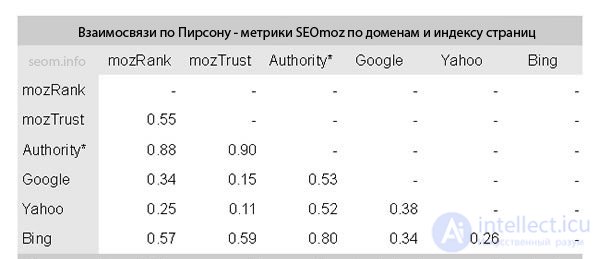
If Google were not accurate in the calculations of indexation, then at our request, we would receive the same is not accurate data. However, some of the results for our query [link: example.com] on Google had a rather high Spearman coefficient (r = 0.65). The power of this relationship is the same between metric and PR. The relationship of PR with the results of the query in Yahoo [linkdomain: example.com -site: example.com] is somewhat smaller and amounts to 0.53.
Google’s stated number of indexed pages per month is not a very accurate parameter and can have significant changes from month to month. So Bing in one month can report an increase in the indexed pages by 355%. Google shows an average growth of 61%, while Yahoo is only a 2% increase.
Not accurate indexing of pages on one domain in Google can be explained by one more thing. When new pages are discovered, Bing relies more and more on Google and Yahoo on the quantity and quality of domain backlinks. However, when it comes to indexing, the search engine follows the traditional PR algorithm. As stated by representatives of Google PR - this is only one of the 200 components that are taken into account when indexing pages. This information is supported by the results of the survey.
Social networks
PR is also very much interconnected with social network indicators, for example, how many times a domain is stored in social bookmarks Delicious (r = 0.49), Digg.com (r = 0.38). It also affects the number of Twitter entries with links to the domain (r = 0.38).
Traffic
The last but not the least important factor is the volume of site traffic. When indexing a site using the PR method, traffic is also very important. According to Quantcast, the number of page views per month and the number of unique visitors are strongly interrelated with PR (r = 0.18). Entering all this data into a table, it becomes clear how important the authority (trust) of the domain is in indexing.
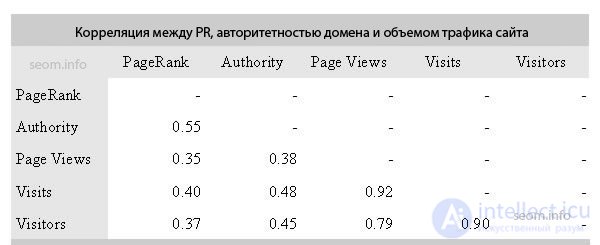
So, what exactly are we talking about all this data?
First, the PR of the home page is a very important factor for SEO , social networks and site traffic entirely.
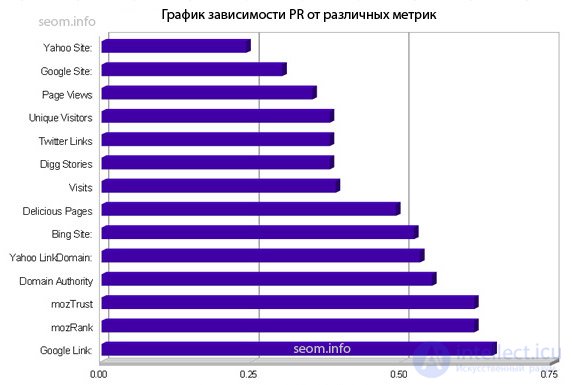
For example, a site with a PR of 7 has 2.6 times more unique visitors than the same site with a PR of the main page = 6, which in turn has 1.5 times more traffic than a PR site of the main page = 5.
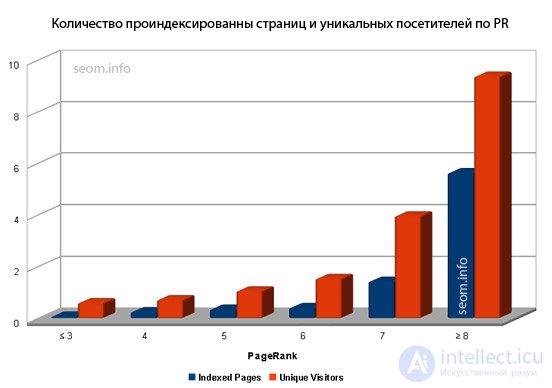
Second, the PR of the main page of the site is often used to determine the PR of the entire domain. Following this theory, the main page of the site should provide all the information about the domain.
Limiting itself to 11th PR values is an excellent tool for determining Google and Yahoo for the number of backlinks a domain, and for Bing the number of pages indexed. But PR cannot be an accurate predictor of constantly changing variables .
Finally, metrics (at the domain level) can be much better than PR for identifying variables relevant to search, social networking, and web analytics. All data received from the domain should be interpreted taking into account the following parameters of the entire domain: high traffic volumes, geo-targeting .
Comments
To leave a comment
seo, smo, monetization, basics of internet marketing
Terms: seo, smo, monetization, basics of internet marketing